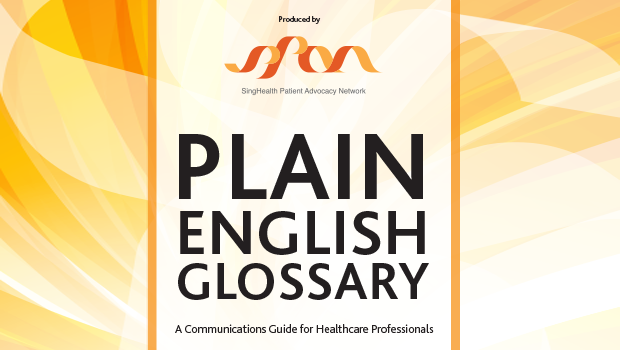
The Plain English Glossary is a project by the *SingHealth Patient Advocacy Network (SPAN) to help healthcare professionals improve their communication with patients, by reducing their reliance on medical jargon. With this, more patients will be empowered to take greater ownership of their own care journey. SPAN member, Mr Chew Kim Soon, is a key member of the network’s Plain English Workgroup that compiled the 150-word Glossary.
“I’ll be giving you some analgesia to reduce pain and inflammation after the cannulation procedure tomorrow. Also, please let us know too if you have acute retention of urine.”
If you have no idea what the above line is about, you are not alone.
In layman’s language, the above line will read as: “I’ll be giving you some painkillers to lessen the pain and swelling after we insert the tube into your body tomorrow. Also, please let us know if you cannot pass any urine.”
Prevalent use of medical jargon
Many patients and caregivers say that they have some problems figuring out what their medical professional is trying to tell them about their condition or treatment.
Mr Chew Kim Soon, member of the SingHealth Patient Advocacy Network (SPAN), is a caregiver to his aged mother. In all his years of accompanying his mother on her medical appointments, he has encountered many medical phrases that are not immediately understandable to him. He said, “I hear words like “ambulate” or “haemorrhage” – words that sound complex to someone like me who isn’t medically trained.”
“Not being able to easily understand what the doctors and nurses were saying made me anxious, naturally. I sometimes take a picture of the case notes and check the terms on an online search!” he added with a chuckle.
The Plain English Glossary
Put together by SPAN, the Plain English Glossary is a compilation of 150 commonly used medical terms explained in simple, everyday English. It also includes examples of how the phrases are used in actual sentences.
A project sparked by ideas and feedback from patient support groups, the Glossary addresses the aspiration for improved communication between healthcare providers and patients, which is important in enhancing care quality. Collated from patients, caregivers and staff, the list of commonly used medical terms were then broken down into simple, layman language and validated by an editorial team comprising nurses and allied health professionals from across SingHealth.
Kim Soon explained, “We wanted to ensure the layman translations were factually accurate, yet simple enough to say and understand. To help us do that, we went through the glossary from the perspective of a reader with primary six education.”
Simpler is better
With the Glossary, more doctors and nurses will be reminded that medical language is not universally understood. Words that roll off the tongue of a doctor, such as “cardiac arrest” or “lymphoedema”, can be explained in layman terms (According to the Glossary, those terms can be simplified to “heart attack” and “swelling of the arm” respectively.)
For a start, the importance of speaking to patients and caregivers in simple, everyday language will be emphasised during orientation programmes for nurses, where they will receive a copy of the Glossary. New doctors will be introduced to the Glossary during their Residency in SingHealth hospitals, while informative sessions held by SPAN will reach out to in-service nurses and other healthcare professionals.
Kim Soon said, “I think medical professionals often speak in medical jargon because they want to be accurate, but they may not realise that patients may not understand what they are trying to say. We hope that more doctors, nurses and healthcare professionals will use this Glossary as a tool to improve communications with patients and caregivers.”
The first edition of the Plain English Glossary comprises 150 commonly used medical terms/words. SPAN will constantly update and expand the glossary to benefit more patients and caregivers. If you would like to offer suggestions, request copies of the Glossary or share feedback, please write to partnersincare@singhealth.com.sg
About the SingHealth Patient Advocacy NetworkThe SingHealth Patient Advocacy Network (SPAN) is a self-driven community of interested patients and caregivers who are committed to representing the voice of patients to enhance patient experience and quality of care.Established in 2017 by the SingHealth Duke-NUS Institute for Patient Safety and Quality (IPSQ), SPAN works in close partnership with IPSQ, SingHealth Group Office of Patient Experience and Group Nursing. Members lend insightful perspectives and are involved in a rich array of projects, ranging from participation in hospital committees for the Future Outpatient Journey and Elective Surgery, to patient and staff education initiatives. |













 Get it on Google Play
Get it on Google Play